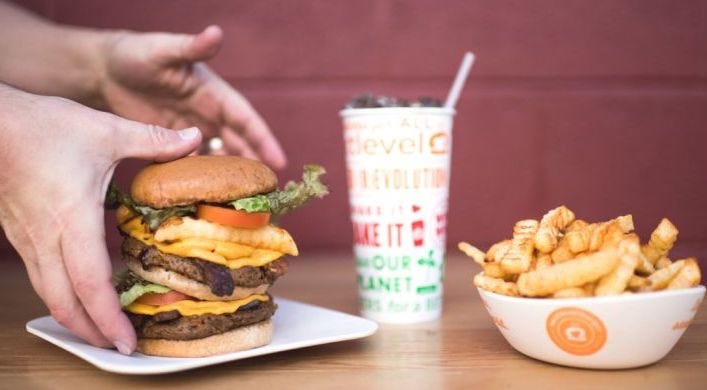€25M Bioeconomy Fund, Fostering Biomanufacturing Talent, and Alt Protein Perspectives Across Asia
Also: Beef's carbon footprint could be up to 63x higher than cultivated meat
Hi, thanks for being here!
Welcome to this week's edition of Better Bioeconomy, where you and I dive into the world of food innovation, exploring how biology, technology, and business are shaping the future of what we eat.
This week, I bring you a blend of collaborations, significant investments, and insightful consumer trends that are defining the evolving landscape of sustainable and cruelty-free food production.
Enjoy!
BIO BUZZ
🎓 Liberation Labs and Ivy Tech Community College-Richmond team up to launch a biomanufacturing workforce training program
The program is designed to train ~30 employees in precision fermentation in preparation for working at Liberation Labs' new plant in Richmond, Indiana, set to begin operations later this year.
Recruitment for the program will start in spring 2024, with training commencing in late summer. It will include a combination of biotechnology and fermentation training, focusing on key principles, manufacturing practices, and safety protocols.
This initiative will create new career opportunities in biomanufacturing for local workers and allow Ivy Tech to enhance its specialisation in biotechnology, benefiting both the community and the future of the industry.
Read full article - vegconomist
🔬 UC Davis launches 'Integrative Center for Alternative Meat and Protein' (iCAMP) to advance commercialisation of alt proteins
iCAMP, in collaboration with key institutions like the USDA, UCLA, and the Culinary Institute of America, will focus on researching and commercialising various alt proteins, including plant-based, fungal, and cultivated meats.
The drive behind this initiative is the forecasted increase in global meat demand by 50–100% over the next 25 years, coupled with the high environmental impact of conventional meat production, which accounts for 60% of food system emissions and has significant land and water usage.
iCAMP aims to address consumer acceptance challenges by developing future proteins that cater to diverse preferences in flavour, nutrition, shelf life, cooking properties, and cost. The taste and texture of alt meats are identified as major hurdles, with taste being the primary factor in repeated consumer purchases.
Read full article - Green Queen
🇭🇺🇩🇰 Lidl Hungary and Denmark's Salling Group lower plant-based product retail prices to match or be lower than animal-based equivalents
Lidl Hungary has lowered the prices of its Vemondo plant-based range to the same level as animal products, offering affordable, sustainable options like vegan yogurt and sausages. Lidl aims to shift towards a more sustainable business model by 2025, increasing its range of vegetable proteins.
Denmark's Salling Group, the country’s largest retailer (market share ~34%), has discounted over 100 plant-based products by at least 10%, as part of its broader initiative to combat inflation and double its plant-based product turnover by 2025.
These initiatives are part of a larger effort to encourage consumers to reduce their climate footprint by opting for plant-based alternatives and to inspire them to try meat alternatives.
Read full article - vegconomist
🐶 PawCo Foods introduced two new plant-based dog food products, including the “very first” fresh shelf-stable plant-based dog food
The two products, InstaBites and LuxBites, are based on GreenMeat™, described as the first fully plant-based meat tailored specifically for pet food. Both products were developed using AI, with a focus on optimizing nutrition and enhancing palatability for pets.
InstaBites is said to be the first fresh shelf-stable plant-based dog food. LuxBites is a premium option formulated with postbiotics and fermented protein to promote gut health, boost immunity, and ensure efficient nutrient absorption.
The global vegan dog food market is expected to grow rapidly, from $12.27 billion in 2021 to $31.48 billion by 2029, at a CAGR of 12.5%.
Read full article - vegconomist
MACRO STUFF
🇮🇳 12 key takeaways from GFI India's survey on consumer awareness, adoption and purchase behaviour for vegan meat and dairy in India
Health and nutrition are the main reasons Indians choose vegan food over environmental or animal welfare concerns.
The primary factors driving consumption of plant-based meat are its protein content, convenience, and ease of cooking.
Poor taste, texture, and compatibility with traditional beverages like coffee and tea are significant deterrents for repeat purchases of plant-based products.
Read all 12 takeaways - Green Queen
🇹🇭 67% of Thai consumers want to eat less meat and replace it with plant-based alternatives, mainly due to health and nutrition concerns
Thai consumers are aware of traditional plant proteins (72%) and meat alternatives (43%), but taste and availability hinder their adoption. Although environmental concerns are acknowledged, only 13% view industrial meat production as a major environmental issue.
Health is the main motivator for choosing plant-based proteins, with 63% perceiving them as healthier than meat, despite 70% considering them too processed. The research highlights 18 factors driving alt protein consumption, with health and nutrition being foremost.
There is strong support among Thai consumers for policies favouring alt proteins, including reduced taxes and increased investment in the sector. However, increased taxes on conventional meat are largely opposed.
Read all article - Green Queen
🤔 Threat or opportunity? The complex and mixed opinions among UK farmers on cultivated meat
A study highlights complex and varied views among UK farmers on cultivated meat. While some see it as a revolutionary technology offering potential opportunities, particularly for arable farming, others express scepticism and concern about its feasibility, texture, flavour, and nutritional value compared to traditional meat.
The research engaged 75 farmers and found predominantly negative reactions, with some labelling cultivated meat as "Frankenstein food" and questioning its safety. However, some farmers also see it as a chance to boost sales of premium animal meat not produced in bioreactors and speculate about new markets for traditional farms.
Farmers raised ethical concerns about the motivations and transparency of cultivated meat companies and feared the concentration of power in the food system. Despite scepticism, there's a recognition of the need for sustainable changes in food production, with cultivated meat seen as a potential solution for accessibility to protein in populations with limited resources.
Read full article - vegconomist
🇸🇬 How do Singapore’s consumers and experts feel about cultivated meat?
The general public views cultivated meat as offering health benefits like food safety and potential nutritional enhancements. Cultivated meat is seen as a cleaner option with reduced risk of transmitting zoonotic diseases. However, concerns exist about long-term health effects and the naturalness of these proteins.
Cultivated meat is believed to aid Singapore in food security, economic benefits, and environmental sustainability due to reduced land use and improved animal welfare. Challenges include societal resistance, especially from religious communities, and the need for certification to enhance acceptance, similar to halal certification for cultured meat.
Experts highlight health benefits and food security as major advantages of cultivated meat but also point out the need for more research and market acceptance. They emphasise the role of government and investment in overcoming challenges related to affordability and public perception.
Read all article - Green Queen
New here? Devour the free subscription and join a list of founders, investors, and biotech enthusiasts leading the food revolution!
BIO BUCKS
🇩🇰 Kost Capital completes first close of €25M target fund to invest in food innovation powered by the bioeconomy in Europe
The Denmark-based fund will invest in pre-seed and seed startups across Europe, specifically targeting B2B inputs in the future of food. Kost Capital's investment thesis is centred around food innovation powered by the bioeconomy.
Kost Capital has established a hub in Frederiksberg, featuring a test kitchen and close collaboration with Kost Studio. This setup aims to bridge the gap between universities and markets, ensuring that significant innovations receive appropriate funding.
The fund's vision includes making Denmark a leading bioeconomy hub in Europe, leveraging the country's rich food history and advanced fermentation and biotechnology sectors. The goal is to combine bioeconomy and gastronomy for scalable, impactful solutions in the food industry.
“We are what we eat, yet the food system is broken. A growing population, climate change, food waste, health issues and policy changes require rapid funding now to ensure sustainability, efficiency and resilience in the future of food. We need to bring Better food for more people…” - Bodil Sidén, General Partner at Kost Capital.
Read full article - EU-Startups
🇫🇮 Enifer received a €12M grant from the EU's NextGenerationEU programme for building a commercial-scale mycoprotein facility
The Finnish biotech startup is developing a mycoprotein ingredient called PEKILO using fungal fermentation and industrial byproducts. The plant, costing €30 million, aims to be completed by 2025 and start production in 2026.
The new facility is anticipated to produce 3 million kg of PEKILO annually, offering a protein yield equivalent to 30,000 cows with at least 20x fewer carbon emissions.
PEKILO is a high-protein, fiber-rich powder with a neutral taste and colour, suitable for various food applications. Enifer aims for global commercialisation post-regulatory approval in the EU, targeted for 2024.
Read full article - vegconomist
🇫🇷 Standing Ovation has received €3M to scale up the production of precision fermentation-derived caseins for novel dairy products
The French biotech company’s CASPEX project received €2 million from the French government as part of the France 2030 investment plan and a €1 million loan from Bpifrance under the Invest EU Green Investment Loan.
The project involves developing a purification line to improve efficiency and reduce production costs. CASPEX also serves as a prototype for future production units, ensuring the company's technological edge.
The purification process is vital for industrialization, enhancing production tool effectiveness and reducing downtime for equipment and staff, thus accelerating production and cutting costs.
Read full article - vegconomist
🍔 Next Level Burger acquired Veggie Grill, making it the largest fast-casual vegan chain in North America
This move follows a year after Veggie Grill was rescued from bankruptcy. The acquisition was facilitated by VegInvest, the investment fund that saved Veggie Grill last year.
With the acquisition, Next Level Burger expands its presence to 27 locations, adding Veggie Grill's 17 outlets to its existing 10.
Matt de Gruyter, co-founder and CEO of Next Level Burger, will replace Veggie Grill's co-founder and CEO, TK Pillan. Pillan, along with other co-founders Ray White and Kevin Boylan, will exit the company.
Read full article - Green Queen
🇨🇦🇨🇭 Lallemand, a Canadian company specialising in yeast-based ingredients, acquired Swiss biotech company Evolva
Evolva, similar to Lallemand, focuses on the research, development, and commercialisation of natural yeast-derived ingredients. These ingredients are used in various sectors, including flavours, fragrances, health ingredients, cosmetics, and health protection.
The purchase price of the acquisition was CHF 20 million (US$23.5 million), with potential adjustments and additional payouts based on sales targets.
Evolva offers a strong strategic fit with Lallemand’s yeast-based technology platform. Evolva's precision fermentation technology and R&D capabilities present an “ideal platform” from which to expand Lallemand's product offering.
Read full article - vegconomist
🇬🇧 Fa Bio secured £5.3M to advance its mission of using superior microbial bioproducts to boost crop production
UK-based biotech company, formerly known as FungiAlert, specialises in discovering and developing microbial bioproducts like biocontrols, biostimulants, and biofertilisers, aimed at replacing chemical inputs in agriculture.
The new funding will aid Fa Bio in commercialising its technology, continuing its research, and expanding its team, focusing on the development of natural alternatives to chemical fertilisers.
Fa Bio's 'SporSenZ' technology enables targeted microbial sampling in agricultural fields, leading to the creation of agricultural bioproducts for critical global food crops.
Read full article - FoodBev
🇰🇷🇺🇸 Better Foods, a plant-based subsidiary of South Korea's Shinsegae Food, secured funding from Cleveland Avenue
Cleveland Avenue is a VC firm founded by Don Thompson, former CEO of McDonald's. The partnership is not only financial but also strategic, as it aims to help Better Foods enter the global market.
The focus will be on developing plant-based products like alt milk and cheese, with a particular emphasis on expanding in the US market. Better Foods has already made a mark in the Korean market with a vegan SPAM-style product, tapping into the cultural popularity of SPAM in South Korea.
Cleveland Avenue was drawn to invest in Better Foods due to its innovative R&D in plant-based products and the potential for future expansion. Additionally, Shinsegae Food's consistent growth, especially in applying meat substitutes in sectors such as food manufacturing and restaurants, was a key factor.
Read full article - vegconomist
🇫🇷 Tereos' plant-based protein brand, Ensemble, raised €4M in funding following a 50% sales growth in 2023
This funding will be used to triple the production capacity of its Marckolsheim plant in Alsace by 2024, enabling the production of proteins for an estimated 15 million meals.
Ensemble has set an ambitious goal of increasing its sales tenfold over the next five years. This target is driven by the rising consumer demand for sustainable, plant-based food alternatives, indicating a significant market opportunity.
The brand recently established a presence in Chicago, aiming to double its global revenue outside the EU from 30% to 60% by 2028. Plans for further expansion into the Asian market are also underway.
Read full article - vegconomist
SOCIAL FEAST
🥩 Beef's carbon footprint could be up to 63x higher than cultivated meat when accounting for the carbon opportunity cost of land
Cultivated meat, using up to 90% less land than beef, could have a dramatically lower carbon footprint, especially if its production's carbon opportunity costs are taken into account.
While cultivated meat may require more energy than conventional meat, this energy can be supplied by renewable sources. As the world's grids become cleaner, the carbon footprint of cultivated meat is expected to decrease over time.
Cultivated meat uses 50–95% less land than traditional meat production, a crucial factor since land cannot be produced or made "cleaner". This efficiency is vital given the non-renewable nature of land resources.
Read post on LinkedIn - Elliot Swartz
🤯 Hyperrealistic salmon made from microalgae
AlgaeCore - SimpliiGood has developed a technology that creates meat and fish alternatives from Spirulina filaments, offering a more authentic texture and nutritional benefits compared to traditional plant-based proteins.
This Spirulina-based product contains twice the protein and iron content, no off-flavors, better functionality and thermal behaviour, and a significantly lower environmental impact – up to ten times less than conventional methods.
The technology is scalable, cost-effective, and highly versatile, with potential applications ranging from mince to nuggets, sausages, chicken, and salmon, indicating a vast array of future possibilities in food innovation.
Read post on LinkedIn - Baruch Dach
🔍 Understanding the ingredient categorization is crucial for your alt protein startup’s success
The categorization of ingredients, especially alternative proteins, is not straightforward and can be challenging due to their ability to fit into multiple categories. This complexity extends beyond mere food labelling, impacting regulatory approvals and market access for food businesses.
The categorization of food ingredients varies depending on both the intended application and the jurisdiction where the ingredient will be sold. Some categories, like novel foods, require risk assessments by authorities due to their lack of historical consumption.
For food businesses, particularly those in the food innovation sector, it's vital to determine if their ingredients fit into pre-established food categories. Doing so can save significant time and effort in the regulatory approval process and adapt to various local regulations and attitudes towards food innovation.
Read post on LinkedIn - Mathilde Do Chi
Got a taste for this newsletter? Dish it out to your friends!👇🏾
EAR FOOD
🇨🇳 Investing in China's protein revolution to tackle climate change
Show: TED on Youtube
Speaker: Tao Zhang, Co-founder of Dao Foods
Tao highlights China's significant contribution to global meat and seafood consumption, stressing the need for China's active participation in climate change initiatives through the adoption of sustainable, alternative proteins.
With China's increasing demand for meat due to rising income, Tao identifies a substantial business opportunity in alternative proteins, emphasising their environmental benefits and the need for products that are tasty, affordable, and culturally appropriate.
Tao calls for innovation, research, and development in the new protein sector, coupled with effective marketing strategies to shift consumer perceptions. He advocates for international collaboration to integrate China into the global effort to address climate challenges.
SPOTLIGHT: Food Jungle
😋 Hungry for weekly updates on the broader food industry?
As a food biotech nerd, sometimes I crave a broader view of the food industry. That’s why I want to take a moment to introduce a food industry newsletter I've grown to love and now wholeheartedly recommend to you: Food Jungle.
Food Jungle serves up a mix of insightful and lighthearted content, making complex topics in the food world accessible and engaging. What type of content can you expect? Here are the topics from Food Jungle’s latest edition:
🌸 Iran struggles to keep its saffron economy alive.
🛒 An American brand touches a nerve in France.
🎟️ Myanmar gets a little push from the United Nations.
🐠 A shocking truth is revealed in Africa and South Asia.
🍺 It turns out you can make beer from bread in the UK.
Interested? Head over to Food Jungle!
*This is not a paid promotion.
THAT’S ALL FOR THIS WEEK!
Take care, and have an awesome week! 🙌🏾
Are you new here?
Know any other geeks who would dig this newsletter?









